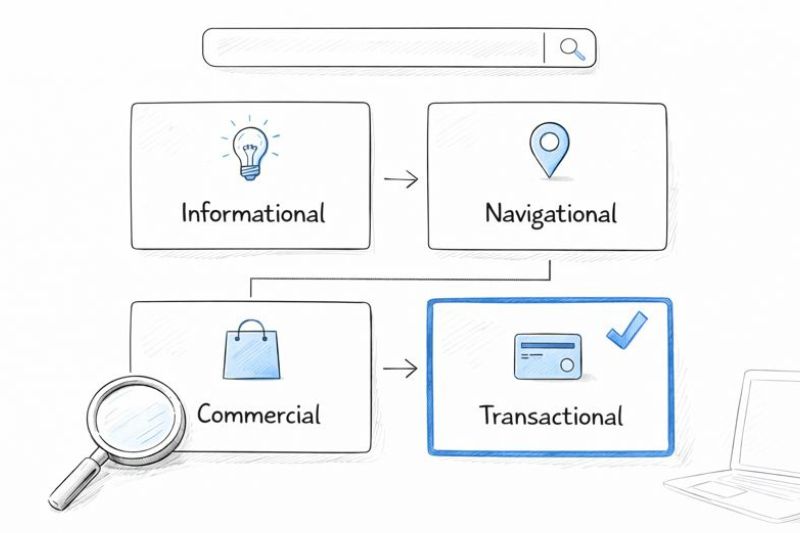How to do keyword research the right way? Stop following the crowd.
After analyzing over 1,000 keyword research campaigns, we’ve discovered something shocking: most businesses are doing keyword research completely backwards. They’re chasing high search volumes instead of high-value customers.
At Batlinks.io, we’ve seen companies spend thousands on keyword research tools, target hundreds of keywords, and still struggle to generate meaningful traffic. The problem isn’t the tools or the effort, it’s the approach.
Ready to fix your keyword research strategy? Book your SEO consultation and discover the keywords that actually drive revenue.
Why Traditional Keyword Research Fails
Most keyword research guides tell you to start with Google Keyword Planner, find high-volume keywords, check keyword difficulty, and create content. This process is fundamentally flawed.
Here’s what they miss: search volume data doesn’t equal business value. A keyword with 50,000 monthly searches that attracts window shoppers is worthless compared to a 500-search keyword that brings ready-to-buy customers.
The Search Volume Trap
Google Keyword Planner shows impressive monthly search volume numbers, but these figures are often misleading. The tool groups similar search terms together and provides volume ranges rather than exact data.
More importantly, high search volumes attract high competition. When everyone targets the same keywords, your content gets lost in the noise.
Smart businesses focus on search intent over search volume.
The Keyword Difficulty Deception
Best keyword research tools provide keyword difficulty scores, but these metrics miss crucial context. A keyword might have “high difficulty” according to the algorithm, but if competing content doesn’t match search intent, there’s still opportunity.
We’ve ranked for supposedly “impossible” keywords because we understood what searchers actually wanted, while competitors created generic content targeting search engines instead of people.
Understanding Search Engines and User Intent
Search engines have evolved beyond simple keyword matching. Google’s algorithm now understands context, user intent, and semantic relationships between search terms.
When someone searches for “keyword research tools,” they’re not just looking for a list. They want to understand which tools solve their specific problems, how much they cost, and whether they’re worth the investment.
The Four Types of Search Intent
Informational Keywords: Users seeking knowledge and answers Examples: “what is keyword research,” “how search engines work,” “SEO strategy basics”
Navigational Keywords: Users looking for specific websites or brands
Examples: “Google Analytics login,” “Ahrefs keyword tool,” “SEMrush pricing”
Commercial Keywords: Users researching before purchasing Examples: “best keyword research tools,” “Google Keyword Planner vs Ahrefs,” “free keyword research tools comparison”
Transactional Keywords: Users ready to take action Examples: “buy keyword research tool,” “SEO consultant near me,” “keyword research service pricing”

The Revenue-Focused Keyword Research Process
Forget the traditional approach. Here’s the keyword research process that actually generates business results:
Step 1: Start With Your Customers
Before opening Google Keyword Planner or any keyword research tools, interview your best customers. Ask them:
-
What specific problems were you trying to solve?
-
What exact search terms did you use?
-
Which keywords led you to our website?
-
What convinced you to choose us over competitors?
Their answers reveal your most valuable target keywords—terms that might have lower search volume but drive higher conversions.
Step 2: Analyze Your Current Keyword Performance
Use Google Analytics and Google Search Console to identify:
-
Keywords already driving traffic to your site
-
Search queries with high impressions but low click-through rates
-
Pages ranking on the second page (easy wins for optimization)
-
Branded vs. non-branded search terms
This analysis shows you which keywords are working and which need improvement.
Step 3: Map Keywords to the Customer Journey
Different keywords serve different purposes in your sales funnel:
Awareness Stage Keywords: Focus keyword research on problem identification Examples: “why is my SEO not working,” “how to increase website traffic”
Consideration Stage Keywords: Solution research and comparison Examples: “keyword research process,” “Google Keyword Planner suggests,” “analyze keywords effectively”
Decision Stage Keywords: Vendor evaluation and selection Examples: “best keyword research tools 2025,” “SEO tools comparison,” “keyword research service reviews”
Action Stage Keywords: Ready-to-purchase searches Examples: “hire keyword research expert,” “SEO agency near me,” “keyword research consultation”
Step 4: Expand Your Seed Keywords
Take your core seed keywords and expand them using these methods:
Google Autocomplete: Type your seed keyword into Google and note the suggested completions. Each suggestion represents real search queries with sufficient volume.
Google Search Results: Scroll to “People also ask” and “Related searches” sections. These reveal semantic keywords and related concepts.
Competitor Analysis: Use keyword research tools to identify which keywords your competitors rank for. Look for gaps where they’re succeeding but you’re not present.
Long-Tail Keyword Variations: Add modifiers to your seed keywords:
-
Location modifiers: “keyword research Chicago,” “SEO tools near me”
-
Intent modifiers: “how to,” “best,” “free,” “cheap,” “review”
-
Temporal modifiers: “2025,” “latest,” “new,” “updated”
Essential Keyword Research Tools
You don’t need dozens of keyword tools. Focus on these essentials:
Free Keyword Research Tools
Google Keyword Planner: The gold standard for search volume data. While designed for Google Ads, it provides valuable insights for organic keyword research.
Pros: Direct Google data, historical trends, geographic targeting
Cons: Requires Google Ads account, grouped volume ranges, limited suggestions
Google Trends: Reveals seasonal patterns and trending topics in your industry.
Google Search Console: Shows actual search queries driving traffic to your site.
Answer The Public: Visualizes question-based keywords and content ideas.
Paid Keyword Research Tools
Ahrefs: Comprehensive keyword database with accurate difficulty scores and competitor analysis.
SEMrush: All-in-one platform with keyword magic tool and content optimization features.
Moz Keyword Explorer: User-friendly interface with priority scores combining multiple metrics.
Choose tools based on your budget and needs. Small businesses can succeed with free tools, while larger companies benefit from advanced paid platforms.
How to Use Google Keyword Planner Effectively
Many people struggle with Google Keyword Planner because they don’t understand its limitations:
-
Set up a Google Ads account (you don’t need to run ads)
-
Enter your seed keywords and select your target location
-
Review search volume ranges (not exact numbers)
-
Export keyword ideas and analyze in spreadsheets
-
Cross-reference with Google Trends for seasonal patterns
Google Keyword Planner suggests related keywords based on your input, but it won’t give you breakthrough insights. Use it as a starting point, not the final answer.
Advanced Keyword Research Strategies
Long-Tail Keywords Strategy
Long-tail keywords are longer, more specific phrases that typically have lower search volumes but higher conversion rates. Instead of targeting “SEO,” target “SEO strategy for small businesses.”
Why long-tail keywords work:
-
Lower competition from other websites
-
Higher search intent clarity
-
Better match for voice search queries
-
More specific content opportunities
-
Higher conversion potential
How to find long-tail keywords:
-
Add specific modifiers to broad terms
-
Use customer language from support tickets
-
Analyze “People also ask” questions
-
Review internal site search queries
-
Study industry forums and communities
Keyword Clustering and Topic Coverage
Modern search engines reward comprehensive topic coverage. Instead of targeting individual keywords, build topic clusters:
Core Topic: Keyword research Supporting Keywords: keyword research tools, keyword research process, keyword difficulty, search volume data, keyword suggestions
Create a pillar page targeting the main topic and supporting pages targeting related keywords. Link them together to reinforce topical authority.
Competitive Keyword Analysis
Don’t just copy competitor keywords, understand their strategy:
-
Identify your top competitors in search results
-
Analyze their highest-traffic pages using SEO tools
-
Find keyword gaps where they rank but you don’t
-
Study their content approach for successful keywords
-
Look for opportunities they’ve missed
Need help identifying your biggest keyword opportunities? Schedule a competitive analysis consultation and discover untapped potential.
Keyword Research for Different Content Types
Blog Post Keywords
Blog posts should target informational and commercial keywords:
-
How-to queries: “how to do keyword research step by step”
-
Educational topics: “what is search engine optimization”
-
Comparison content: “Google Keyword Planner vs free alternatives”
-
Industry insights: “keyword research trends 2025”
Focus on providing comprehensive answers that establish your expertise.
Service Page Keywords
Service pages should target commercial and transactional keywords:
-
Service descriptions: “professional keyword research services”
-
Location-based: “SEO consultant [city name]”
-
Solution-focused: “increase website traffic through keyword optimization”
-
Comparison terms: “why choose our keyword research service”
Product Page Keywords
Product pages need transactional and specific product keywords:
-
Product names and variations
-
Feature-specific terms
-
Buying intent phrases: “buy,” “price,” “cost,” “review”
-
Brand + product combinations
Measuring Keyword Research Success
Track these metrics to ensure your keyword strategy drives business results:
Organic Traffic Growth
Monitor overall organic search traffic, but focus on traffic from your target keywords. Use Google Analytics to segment organic traffic and identify top-performing search terms.
Keyword Rankings
Track rankings for your priority keywords, but remember that rankings don’t equal revenue. Focus on keywords that drive qualified traffic.
Conversion Metrics
Measure how well keyword-driven traffic converts:
-
Goal completions from organic search
-
Lead generation by keyword
-
Revenue attribution to specific search terms
-
Customer lifetime value by acquisition keyword
Search Engine Results Page (SERP) Features
Monitor whether your content appears in featured snippets, local packs, image results, or other SERP features. These can significantly increase click-through rates.
Common Keyword Research Mistakes
Mistake 1: Prioritizing Search Volume Over Intent
High-volume keywords attract lots of traffic but often have poor conversion rates. Focus on keywords that match your ideal customer’s search intent.
Wrong approach: Target “marketing” (165,000 monthly searches)
Right approach: Target “marketing automation for SaaS companies” (320 monthly searches)
The specific keyword attracts qualified prospects ready to engage with your services.
Mistake 2: Ignoring Search Results Analysis
Keyword difficulty scores don’t tell the whole story. Manually review the top 10 search results for your target keywords:
-
Are the results relevant to the search query?
-
Do they provide comprehensive answers?
-
Is there room for improvement or different angles?
Sometimes “impossible” keywords are easier to rank for than tools suggest.
Mistake 3: Focusing Only on Google Search
People search on multiple platforms:
-
YouTube for video content
-
Amazon for product research
-
LinkedIn for B2B solutions
-
Pinterest for visual inspiration
-
Industry-specific platforms
Expand your keyword research beyond Google search to capture audiences wherever they’re looking for solutions.
Mistake 4: Neglecting Semantic Keywords
Google understands related terms and synonyms. You don’t need to repeat your exact keyword phrase repeatedly. Instead, use variations and related terms:
Primary keyword: “keyword research tools”
Semantic variations: “SEO research platforms,” “search term analyzers,” “keyword discovery software”
This approach creates more natural content while still targeting your primary focus keyword.
The Future of Keyword Research
Keyword research continues evolving as search engines become more sophisticated:
Voice Search Impact
Voice searches are longer and more conversational than text searches. Optimize for natural language questions:
-
“What are the best keyword research tools for beginners?”
-
“How do I find keywords that my competitors are using?”
-
“Where can I get free keyword research data?”
AI and Search Evolution
Artificial intelligence is changing how search engines understand and respond to queries. Focus on comprehensive topic coverage rather than exact keyword matching.
Create content that answers related questions and provides complete solutions to user problems.
Mobile Search Behavior
Mobile searches often have local intent and immediate needs. Ensure your keyword strategy includes:
-
“Near me” variations for local services
-
Mobile-friendly content formats
-
Quick-loading pages optimized for mobile users
Implementation: Your Next Steps
Transform your keyword research from traffic-focused to revenue-focused:
Week 1: Customer Research
-
Interview 5-10 recent customers about their search behavior
-
Analyze support tickets for common questions and language
-
Review sales conversations for keywords prospects actually use
Week 2: Current Performance Analysis
-
Audit your existing keyword rankings in Google Search Console
-
Identify high-opportunity keywords (ranking positions 6-15)
-
Find content gaps where competitors are succeeding
Week 3: Strategic Keyword Selection
-
Use the keyword research process outlined above
-
Prioritize keywords based on business value, not just search volume
-
Create keyword clusters around core business themes
Week 4: Content Planning and Creation
-
Map target keywords to specific pages and content pieces
-
Create an editorial calendar based on keyword priorities
-
Begin producing content that matches search intent
Ready to implement a keyword research strategy that actually drives business growth? Contact us today and let’s identify the keywords that will transform your organic search performance.
Stop chasing vanity metrics. Start attracting customers.
How do you do keyword research step by step?
Start by understanding your customers’ language and search behavior. Interview recent customers about their search process. Then use keyword research tools to expand your seed keywords, analyze search volume data, assess keyword difficulty, and prioritize based on business value rather than search volume alone.
The complete process involves customer research, competitor analysis, keyword expansion, intent classification, content mapping, and performance tracking.
How many keywords should I target per page?
Focus on one primary keyword per page, plus 3-5 related secondary keywords. Modern search engines understand semantic relationships, so you don’t need to target every possible variation.
Your chosen keyword should appear in the title tag, meta description, and naturally throughout the content. Support it with related keywords that provide context and depth.
What are the best free keyword research tools?
Google Keyword Planner provides the most accurate search volume data since it comes directly from Google. Combine it with Google Trends for seasonal insights, Google Search Console for current performance data, and Answer The Public for question-based keyword ideas.
While free tools have limitations, they’re sufficient for small businesses getting started with keyword research.
How do you find keywords with low competition?
Look for long-tail keywords with specific modifiers. Instead of “marketing,” target “email marketing for restaurants.” These specific phrases typically have less competition while attracting more qualified traffic.
Also analyze the actual search results, not just difficulty scores. Sometimes “high competition” keywords have poor-quality content that you can easily outrank with better, more helpful information.
Should I target high search volume keywords?
Not necessarily. High search volume often means high competition and generic intent. Focus on keywords that align with your business goals and attract your ideal customers, regardless of search volume.
A keyword with 500 monthly searches that converts at 15% is more valuable than one with 5,000 searches that converts at 1%.
How often should I update my keyword research?
Review your keyword strategy quarterly and conduct comprehensive research annually. Search behavior evolves, new competitors emerge, and your business focus may shift.
More importantly, continuously monitor which keywords actually drive business results and adjust your strategy based on performance data.


